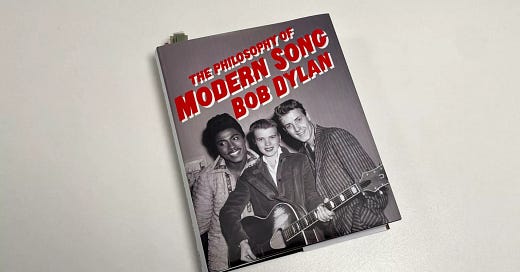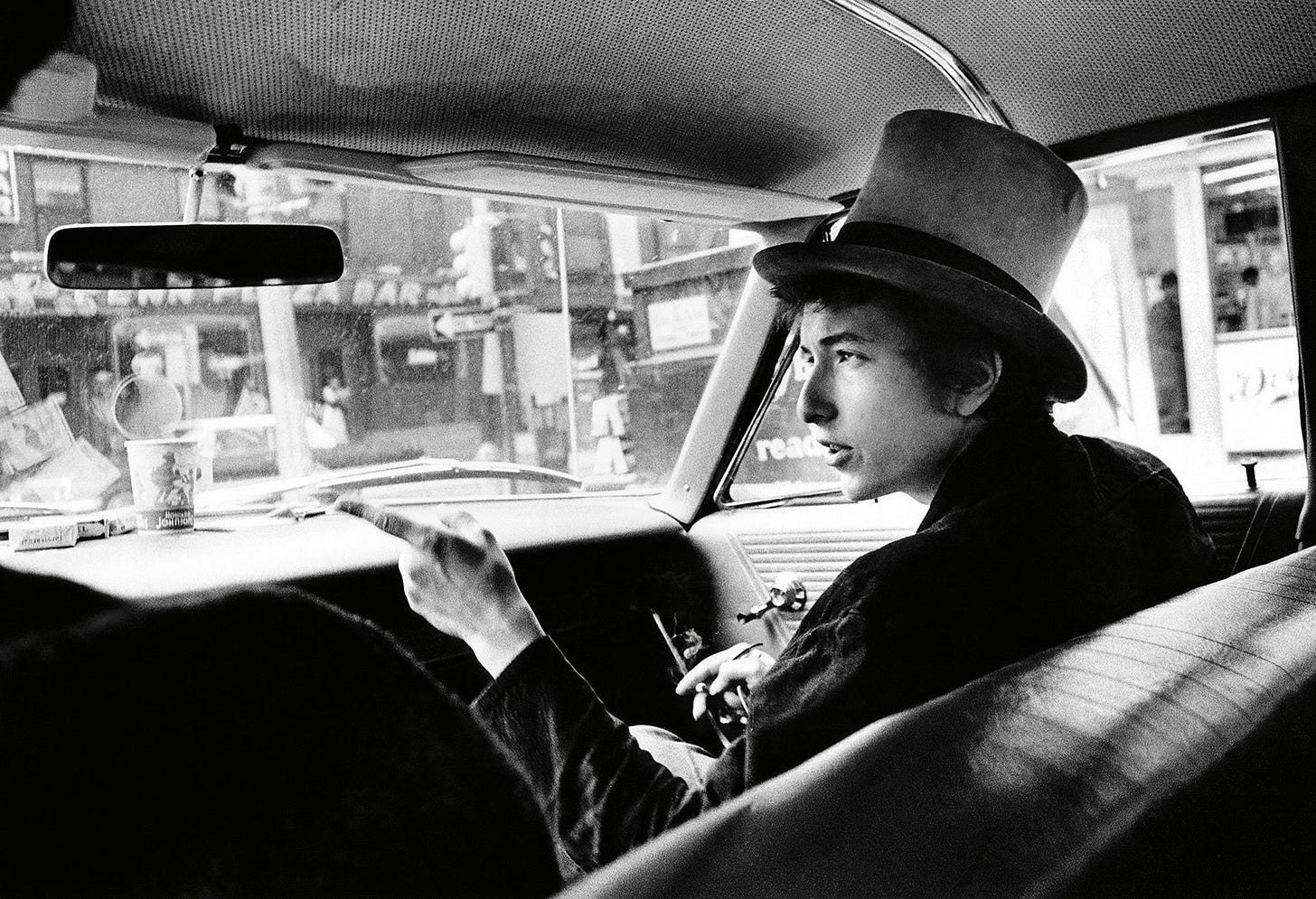"The Modern Philosophy of Song": Good, Fun and Uniquely Bob Dylan
Despite its mixed reviews, real fans of Dylan will appreciate his quirky, eccentric new book
Recently, I got my hands on Bob Dylan’s new book, “The Philosophy of Modern Song”. It’s admittedly less about the philosophy of modern songs than it is Dylan waxing poetic about music he grew up with, and it’s caused a few mixed reviews. Although Dylan’s a Nobel Prize winner with many books under his belt, some reviewers felt the book’s title was misleading. Some also thought there weren’t enough songs by women. Overall, it was well-received, though. “Modern Song” is so simple, yet so divisive; it’s on brand for Dylan, so I’m not sure why readers expected anything else. Did you really expect him to give you direct advice regarding the philosophy of modern music? Ha.
It’s very funny to me that people feel duped by this book. Dylan has been a controversial figure in pop culture for six decades and has never once been a straight shooter. This book was never going to consist of Dylan directly explaining to us why the 66 selected songs are important to the fabric of modern culture. That would be way too easy. Remember, we’re talking about the same guy who gave this absurd lie of an answer in a 1966 Playboy interview, when asked why he chose to be a musician:
Carelessness. I lost my one true love. I started drinking. The first thing I know, I’m in a card game. Then I’m in a crap game. I wake up in a pool hall. Then this big Mexican lady drags me off the table, takes me to Philadelphia. She leaves me alone in her house, and it burns down. I wind up in Phoenix. I get a job as a Chinaman. I start working in a dime store, and move in with a 13-year-old girl. Then this big Mexican lady from Philadelphia comes in and burns the house down. I go down to Dallas. I get a job as a “before” in a Charles Atlas “before and after” ad. I move in with a delivery boy who can cook fantastic chili and hot dogs. Then this 13-year-old girl from Phoenix comes and burns the house down. The delivery boy — he ain’t so mild: He gives her the knife, and the next thing I know I’m in Omaha. It’s so cold there, by this time I’m robbing my own bicycles and frying my own fish. I stumble onto some luck and get a job as a carburetor out at the hot-rod races every Thursday night. I move in with a high school teacher who also does a little plumbing on the side, who ain’t much to look at, but who’s built a special kind of refrigerator that can turn newspaper into lettuce. Everything’s going good until that delivery boy shows up and tries to knife me. Needless to say, he burned the house down, and I hit the road. The first guy that picked me up asked me if I wanted to be a star. What could I say?
If you’re looking for an author to scientifically break down the cultural influence behind popular American music, I’m sure there are other books out there that fit the bill. This is not that. There’s no obvious rhyme or reason behind the tracks that Dylan chose; it’s collection of 66 songs that are influential, impactful or important in the eyes of the author. And I wouldn’t have it any other way.
After reading the entirety of “Modern Song”, there are some records in there that Dylan doesn’t even seem to actually like. A glowing review of the book from Anne Margaret Daniel of the Spectator notes that Dylan just uses some of these iconic tunes “to illustrate points, to instruct and to entertain, not to… tell us what he likes best.”
Dylan is writing feverishly about music he may or may not like. Each passage touches on the feelings— or the emotional intensity— of the songs’ stories, and rarely mentions the structural makeup or even the musical style of the song he’s writing about. It’s a patchwork of ideas that Dylan believes makes each song great, much like the iconic lyrical style of his own music.
The thing that makes Dylan so legendary is precisely that. Many of his finest works are packed with unforgettable lyrics that you couldn’t get me to synthesize with a gun to my head, but still rattle around my mind since the moment I first heard them. He hides his own feelings behind tragically poetic cloaked phrases and abstract ideas within his music. He tells stories using fractured, downtrodden, Shakespearean characters, albeit with the same verve and intensity that John Prine or Marvin Gaye used direct ideas to let their soul bleed on wax.
From railroad men smoking eyelids or punching cigarettes to Rosemary drinking hard and seeing her reflection in the knife, his stanzas have an unique way of sticking to your cerebral membrane. While slightly less cryptic, the way Dylan writes about music in “Modern Song” has the same eccentric touch and boyish excitement as the lyrics in his music. You feel the passion pouring off of every page (like it was written in my soul from me to you, perhaps), like Dylan was trembling with excitement knowing that people would read how he feels about these records. The way he talks about some of this music reminds me of the way Quentin Tarantino talks about cinema. There’s something uniquely accessible and idealistic about the greatest minds of the medium talking about their favorite pieces of work with the same passion and joie de vivre that us normies do.
After all, Dylan’s mystique is part of why we love him. It makes him an enthralling figure, someone who possesses the gift of greatness without perceptibly putting in the necessary amount of work to attain that status. We love him, as a culture, in the same way that we love polarizing athletes with genius talent and a streak of deviance, like Diego Maradona or Allen Iverson as opposed to, say, Michael Platini or Tim Duncan, greats from the same era who did it “the right way”. They are the closest things we have to superheroes; demigods blessed with generational skills that have no business living among us mere mortals.
This week, I was reading an old blog post by John Thorn about early 20th century baseball pitcher Rube Waddell, one of American sports’ first true individualists. He was one of those guys who lived a hundred lives in one, from tending bar in Appalachia to getting bit by a lion to being baseball’s strikeout king for six straight years. There’s a quote from Thorn’s piece that stuck with me about why these athletes appeal to us:
Why do we glorify natural athletes when hard workers, conscientious practitioners of their craft, are so much more admirable as men? Because in their untutored excellence these fortunate few seem to be touched with the divine, the mysterious gift of the gods-- a spirit of play akin to the inexplicable animating force of art.
But this is why books like “The Philosophy of Modern Song'' are so welcome, and sometimes even jarring. Like Tarantino’s love of the movies, Dylan’s book is an unfamiliar glimpse into the humanity of pop culture’s most infamously inaccessible celebrity. While it obviously stands to reason, it’s so surprising to see men whose creative capacities are seemingly touched by God to intake art the same way we do. It’s comforting, if not a little bit exciting, and provides us with the illusion that maybe-- just maybe-- these legends are just like us.




